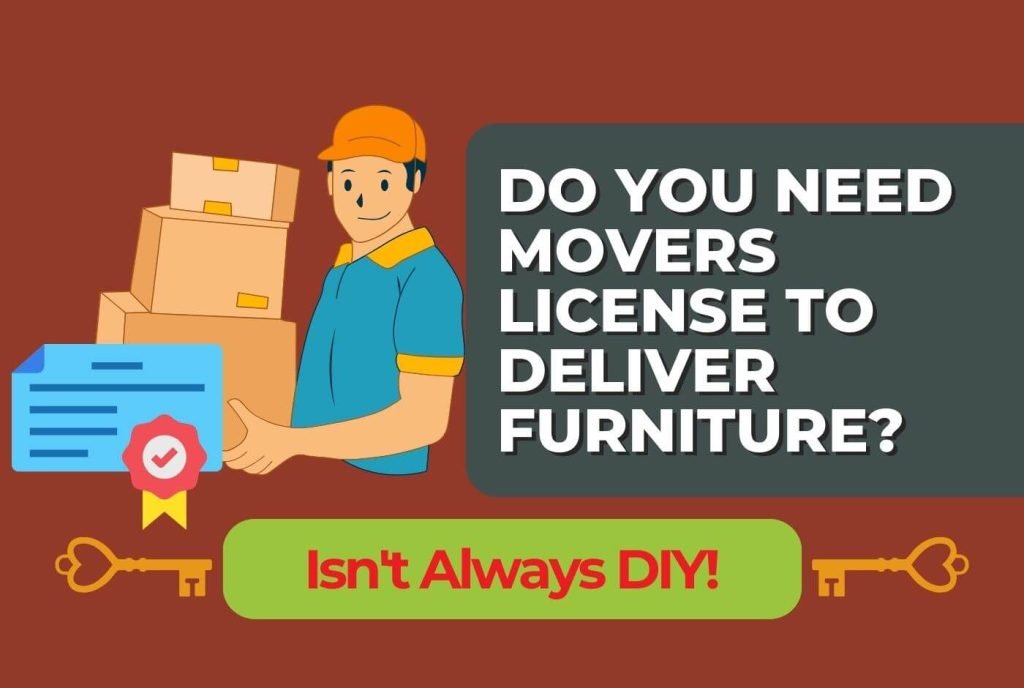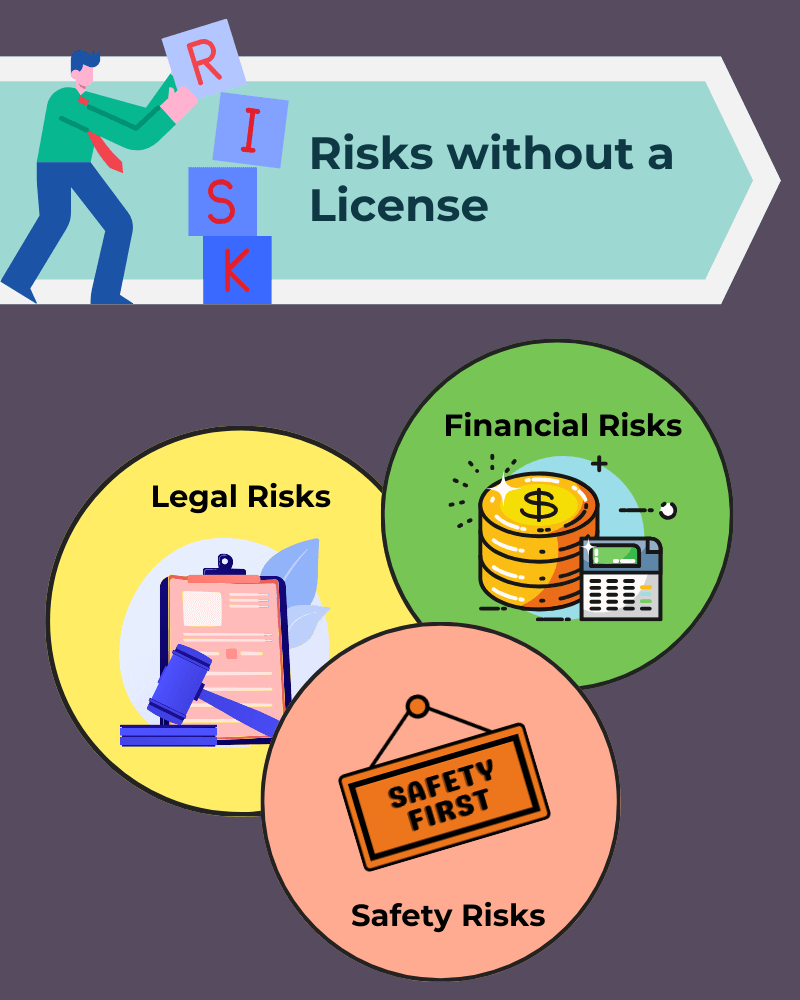Yes, movers need license to deliver furniture and other belongings for the legislation with the state.
Last year, when my uncle moved to Missouri from New Jersey, he used one of the local movers without a license. He trusted them, and they damaged most of the furniture while he was moving. They didn’t even have enough skill to disassemble the furniture for a smooth move.

So, movers must have a license for the delivery of furniture for safety purposes and especially to avoid scams.
However, this article can help you. I’ll be sharing about when movers need the license and when they don’t, along with the risks of delivering furniture without a license.
When you Don’t Need Movers License to Deliver furniture?
Though in most cases, movers need at least the federal state license, there are some options when you don’t need a movers license to deliver furniture, and they are-
DIY or Non-Commercial Personal Move
Moving for yourself or your friends or family means the non-commercial movers don’t need a license to deliver furniture. When I brought the treadmill from my aunt’s house, I needed neither any specific license nor a local permit.
Short Distance Move
Sometimes, moving within a very short distance might not need any license. It’s something like going to your neighborhood.
Small & Lightweight Furniture
You may not need a license if your furniture is minimal and lightweight and can be easily carried in a car or small van. However, the specifics can vary, so it’s essential to check with local authorities to determine whether a license is required.
Deliveries for Retail Furniture Store
Movers working for retail furniture stores don’t need any separate license to move the furniture. You see, the stores or that business already hold the essential licenses. However, a commercial driver’s license might be something you should check.
Variety in Local Regulations
Some states don’t need any federal license for delivering furniture. So, if you deliver furniture in one of those states, you don’t need any permit. For example, moving furniture in New Hampshire does not require a federal license, only a driver’s license.
Why Do You Need Movers License to Deliver Furniture
While moving from Arizona to North Carolina, Bill Pompliano’s belongings were held hostage after hiring a local broker without any licenses. While interviewing with Newsweek, he cried, saying,
“There was a lot of emotional stuff that was missing, like his piano,”
Something like this can happen if you don’t have a movers license while delivering furniture.
Basically, these licenses ensure that movers operate safely and follow state regulations. And especially the USDOT license number is significant in verifying the trustworthiness of the movers’ team.
Other than these, licensed and insured can provide high-quality service, as they have the required experience and enough skills to handle furniture delivery and other moving tasks with tactics.
Licensing Requirements for Furniture Delivery by State in the USA
Licensing requirements for furniture delivery can vary from state to state. However, some states don’t need any license for furniture delivery within a particular distance. Check out the list below-
| State | State License | USDOT | Licensing Agency | Requirement |
| California | Yes | No | California Public Utilities Commission (CPUC) | For intrastate & USDOT for interstate move |
| Texas | Yes | No | Texas Department of Motor Vehicles (TxDMV) | Exemptions for intrastate moves under 50 miles |
| Florida | Yes | Yes | Florida Department of Agriculture and Consumer Services (FDACS) | Requires fingerprinting and background checks |
| New York | Yes | Yes | New York State Department of Transportation (NYSDOT) | Requires fingerprinting and background checks |
| Pennsylvania | Yes | No | Pennsylvania Public Utility Commission (PUC) | For intrastate & USDOT for interstate move |
| Illinois | Yes | No | Illinois Commerce Commission (ILCC) | Applies to moves exceeding certain weight limits |
| Ohio | Yes | Yes | Public Utilities Commission of Ohio (PUCO) | Exemptions for intrastate moves under 50 miles |
| Georgia | N/A | Yes | Georgia Department of Public Safety (GDPS) | Exemptions for small moves and intrastate moves under 50 miles |
| North Carolina | N/A | No | North Carolina Utilities Commission (NCUC) | Requires insurance and USDOT number for interstate moves |
| Michigan | Yes | Yes | Michigan Department of Licensing and Regulatory Affairs (LARA) | For intrastate & USDOT for interstate move |
| New Jersey | Yes | No | New Jersey Division of Consumer Affairs | No state license, but local permits may be required |
| Alaska | Not | Yes | N/A | No state license, but local permits may be required |
| Virginia | Yes | No | Virginia Department of Motor Vehicles (VADMV) | For interstate |
| Tennessee | Yes | Yes | Tennessee Department of Commerce and Insurance (TDCI) | For intrastate & USDOT for interstate move |
| Arizona | Not | Yes | N/A | US DOT for interstate move |
| Colorado | Yes | Yes | Colorado Public Utilities Commission (PUC) | Household Goods Mover License |
| Delaware | Not | No | N/A | No license for “occasional” moves. |
| District of Columbia | Not | No | N/A | No license for the move within a 10-mile |
In most cases, we can see that states with no state license requirement might need other regulations like insurance, local permits, and vehicle safety standards. However, it’s always ideal to cross-check this with your state’s Department of Transportation or Public Utility Commission.
Risks of Delivering Furniture without a License

Furniture delivery without a license can have several significant risks such as legal, financial and other safety risks. Check them out-
Legal Risks:
Legal risks of delivering furniture without a license include the penalties and fines for not following local or state laws. However, the moving company can be ceased for transporting furniture without a license.
Financial Risks:
Without the license for delivery of furniture, it can cause you financial damage. You might need to spend to hire a lawyer to defend against the legal actions of the authorities.
Other financial losses from damage or theft can add to the expense.
Nowadays, moving scams are rising high. According to the Federal Trade Commission,
“In 2023, 12% more moving scam reports have been filed with Better Business Bureau than last year.”
Consumers reported losing more money for being the victim of such scams.
Safety Risks:
Without a license means without proper training and skill, which can damage furniture while moving and cause you great loss.
According to the FTC report,
“Consumers lost an average of $836 to moving scams in 2023.”
Again, without a license, you may have to face denial from the insurer if any accidents or damage happens.
People Also Asked
What is the Difference Between a DOT and an MC Number?
People often mix the DOT and MC numbers while they are two completely different licensing numbers. The main difference between a DOT number and an MC number is that a USDOT(U.S. Department of Transportation) number shows a U.S.-authorized motor vehicle for carrying goods and passengers, while an MC (Motor Carrier) number is needed to transport goods interstate. Though both are authorized by FMCSA, a USDOT number is something you always need, while an MC number is needed when crossing over into another state.
Why do Moving Companies Require a License?
All moving companies must have a license to ensure a safe and legal move, avoiding scams and other damage or loss. And for basic licensing, a USDOT number must provide at least trustworthiness.
Wrapping It Up!
Though some states don’t need license to deliver furniture local permits usually offer some value. However, we can see that furniture delivery for personal purposes or for family or friends doesn’t need any specific license. So, it’s always best to check local authorization agencies for both a safe and legitimate move.
- How to Prepare Your Lawn Tractor for Moving - March 24, 2024
- How to Prepare for Moving in the Snow: Guide for Prevention - March 24, 2024
- Tips to Get a Precise Moving Quote - March 19, 2024